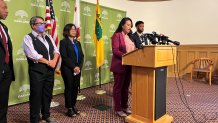While focusing on staffing issues plaguing Oakland’s failing 911 system, city officials recently confirmed they’re still sitting on 911 technology purchased in 2018. According to a recent Alameda County civil grand jury report, implementation of the new software to update Oakland’s 20-year-old 911 system has been “perpetually delayed.”
If the city continues to delay “the city risks a catastrophic failure” where 911 dispatchers “will be back to paper and pencil,” the report said.
Last July, that situation happened. The city blamed it on a power outage. Officials said they have upgraded the city’s backup power supply and created a testing program to confirm the equipment works.
In 2017, Oakland city council authorized $12.8 million dollars to install a new 911 public safety IT system.
Currently, Oakland has the second worst 911 answering time in California, the worst out of every city and county in the state, an earlier news report by the NBC Bay Area Investigative Unit found. Last year, the city had more than 50,000 abandoned 911 calls, meaning people hung up before a dispatcher could answer. Some people reported waiting up to 10 minutes to talk to a dispatcher.
In a press conference last week Oakland Mayor Sheng Thao said she personally experienced waiting on hold after calling 911.
“Response times have been a longstanding issue for the city,” Mayor Thao said. “I’m extremely happy to announce thanks to additional revenues collected this year we are able to direct an additional $2.5 million dollars over the next two years to strengthen our 911 response.”

Whether these additional funds are enough to upgrade Oakland’s outdated 911 system is to be determined.
Get a weekly recap of the latest San Francisco Bay Area housing news. Sign up for NBC Bay Area’s Housing Deconstructed newsletter.
Regarding Oakland’s outdated 911 technology, City Administrator Jestin Johnson said there’s been a recent change order to Oakland’s contract with Motorola to finally implement the new computer aided dispatch (CAD) system.
The change order, caused by the perpetual delays, will cost taxpayers even more. It is expected to add an additional cost of $150,000 to the project, according to Oakland. When the Investigative Unit asked about Oakland’s handling of the 2018 funds and the constant project delays, Johnson said he couldn’t speak to what happened in the past.
“Our mayor and council and leadership [are] working aggressively to ensure that what we’re doing now, we’re taking a day forward approach,” Johnson said. “What happened in the past, it’s certainly there. But at present, we’re going to keep moving aggressively to ensure that the implementation schedule that we have with respect to commitment to these funds…it happens expeditiously.”
According to the recent civil grand jury report, part of the reluctance to the new software is that the new system collects far more data. Crimes might appear to be increasing when, in reality, it will be the result of more complete data. Grand jurors said the city would need a public information officer to help provide context around the new data.
Oakland officials did not respond to follow-up requests for comment. A draft of the city’s formal response to the grand jury report is expected to go before city council in October.
Catch up on the Investigative Unit's earlier 911 reports:
Part 1: ‘I don't dial 911 anymore': Oakland's worsening 911 crisis
Part 2: Oakland's 911 system was down 30 hour. It's part of a bigger issue
Part 3: CHP Bay Area responds to having longest 911 answering times in California
Part 4: Californians paid more than a $1B into 911 over the years as oversight falls behind
Part 5: Oakland mayor announces $2.5M investment into city's 911 system



